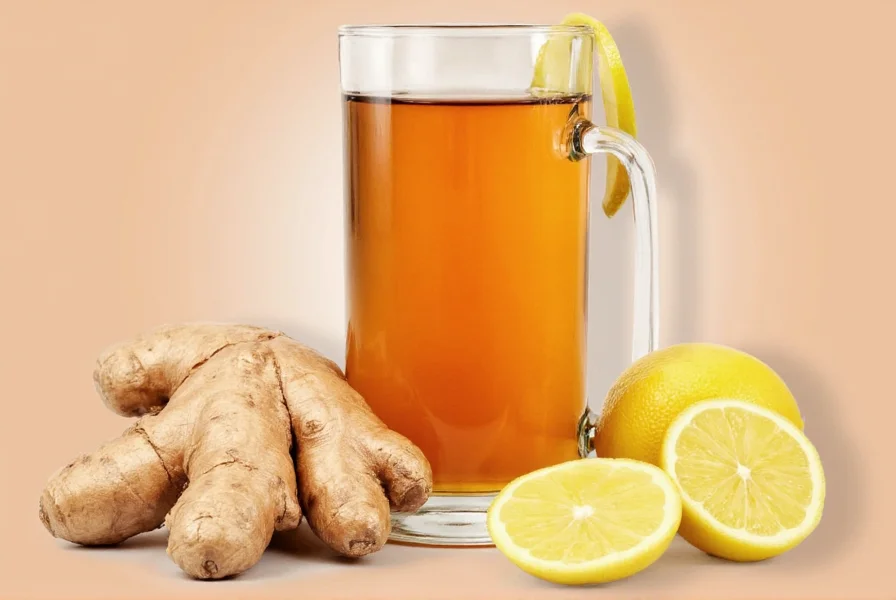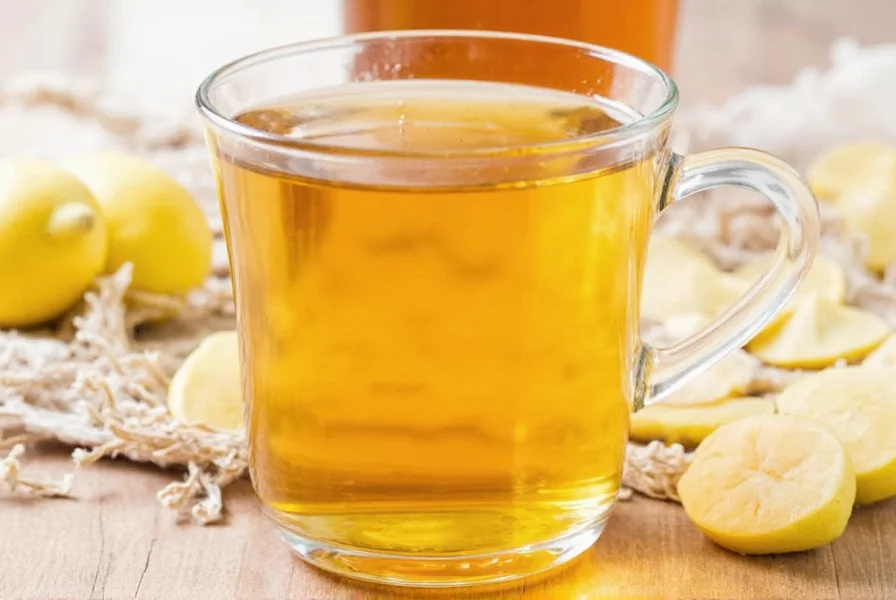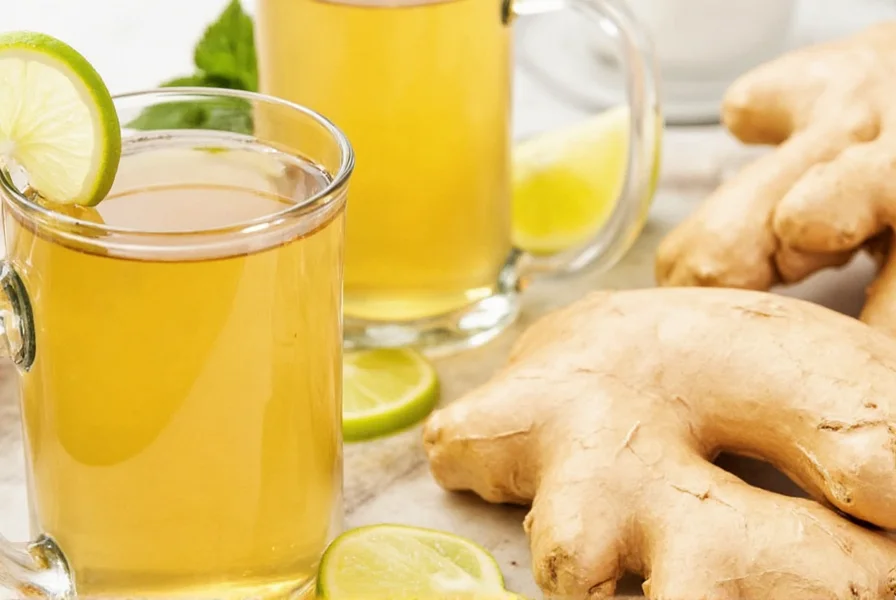Making ginger tea at home is one of the simplest wellness practices you can incorporate into your daily routine. This ancient remedy has stood the test of time for good reason—fresh ginger contains potent bioactive compounds like gingerol that provide anti-inflammatory and digestive benefits. Whether you're seeking relief from nausea, looking to boost your immune system, or simply want a comforting caffeine-free beverage, homemade ginger tea delivers.
Essential Ingredients for Perfect Ginger Tea
The beauty of making ginger tea lies in its simplicity. You only need a few basic ingredients, though optional additions can enhance both flavor and health properties:
| Core Ingredients | Optional Enhancements |
|---|---|
| Fresh ginger root (1-2 inches per cup) | Fresh lemon slices or juice |
| Purified water | Raw honey or maple syrup |
| Peeler or spoon (for skin removal) | Fresh mint leaves |
| Small saucepan | Cinnamon stick |
| Strainer | Turmeric powder (¼ tsp) |

Step-by-Step Guide to Making Ginger Tea
Follow these straightforward steps to create the perfect cup of ginger tea every time. This method ensures you extract maximum flavor and beneficial compounds from the ginger root.
- Prepare the ginger: Wash 1-2 inches of fresh ginger root thoroughly. Use a spoon to gently scrape off the thin skin—this method removes less of the valuable outer layer than peeling with a knife.
- Cut or grate: For stronger tea, finely grate the ginger. For milder flavor, thinly slice or chop into small pieces. The increased surface area releases more gingerol into your tea.
- Simmer: Add ginger to 1 cup of cold water in a small saucepan. Bring to a boil, then reduce heat and simmer uncovered for 10-15 minutes. Longer simmering creates a stronger, more medicinal tea.
- Strain: Pour the tea through a fine mesh strainer into your cup to remove ginger pieces.
- Enhance: Add lemon juice (½ slice per cup) and honey (1 tsp) to taste. Stir well before enjoying.
Popular Ginger Tea Variations
While basic ginger tea delivers significant benefits, these variations address specific wellness goals and taste preferences when making ginger tea at home:
- Ginger lemon tea for immunity: Add the juice of ½ lemon during the last 2 minutes of simmering. Vitamin C from lemon enhances ginger's antioxidant properties.
- Ginger honey tea for sore throat: Use 2 teaspoons of raw honey per cup after straining. Honey's antimicrobial properties complement ginger's anti-inflammatory effects.
- Ginger turmeric tea for inflammation: Add ¼ teaspoon turmeric and a pinch of black pepper during simmering. This combination creates a powerful anti-inflammatory beverage.
- Cold-brew ginger tea: For a less spicy, refreshing option, steep grated ginger in cold water for 4-12 hours in the refrigerator.
Science-Backed Health Benefits of Homemade Ginger Tea
When you make ginger tea from fresh ingredients, you access well-documented health benefits supported by clinical research:
- Digestive support: Ginger stimulates digestive enzymes and accelerates gastric emptying, reducing bloating and discomfort after meals.
- Nausea relief: Multiple studies confirm ginger's effectiveness against morning sickness, motion sickness, and chemotherapy-induced nausea.
- Inflammation reduction: Gingerol compounds inhibit inflammatory pathways in the body, potentially reducing muscle pain and osteoarthritis symptoms.
- Immune system boost: The antimicrobial properties in fresh ginger help fight common pathogens while warming the body.
- Circulation improvement: Ginger tea promotes blood flow and may help regulate blood pressure through its vasodilatory effects.
Expert Tips for the Best Ginger Tea Experience
Follow these professional recommendations when preparing ginger tea to maximize flavor and benefits:
- Fresh vs. dried ginger: Fresh ginger contains higher levels of gingerol than dried powder. For medicinal purposes, always use fresh root when making ginger tea.
- Water temperature matters: Never use boiling water directly on ginger—start with cold water and bring to a simmer for optimal compound extraction.
- Timing is crucial: Simmer for at least 10 minutes to extract beneficial compounds, but don't exceed 20 minutes or the tea becomes overly bitter.
- Storage solution: Brew a larger batch and store in glass containers in the refrigerator for up to 3 days. Reheat gently without boiling.
- Organic preference: Choose organic ginger when possible, as conventional ginger often contains pesticide residues in its thin skin.

Avoiding Common Ginger Tea Mistakes
Many people unintentionally reduce the effectiveness of their ginger tea. Watch out for these frequent errors:
- Peeling too deeply: The most potent compounds concentrate just beneath the skin. Use a spoon to remove only the thin outer layer.
- Using pre-ground ginger: Powdered ginger loses potency quickly and contains significantly less gingerol than fresh root.
- Over-boiling: Extended boiling degrades delicate compounds and creates excessive bitterness.
- Adding honey to boiling tea: High heat destroys honey's beneficial enzymes. Always add honey after removing tea from heat.
- Using tap water with chlorine: Chlorine affects flavor and may interact with ginger compounds. Filtered or spring water yields better results.
Frequently Asked Questions
How much ginger should I use per cup of tea?
Use 1 inch of fresh ginger root per 8 ounces of water for standard strength tea. Increase to 2 inches for stronger medicinal tea. One inch of ginger typically yields about 1 tablespoon when grated.
How long does homemade ginger tea stay fresh?
Freshly made ginger tea keeps for 3-4 days when stored in a sealed glass container in the refrigerator. For best results, don't add lemon or honey until serving. The tea may develop a slightly stronger flavor as it sits.
Can I make ginger tea with dried ginger powder?
Yes, but fresh ginger provides significantly more health benefits. If using powder, substitute ¼ teaspoon of ginger powder for every inch of fresh ginger. Note that dried ginger contains less gingerol and more shogaol, creating a different flavor profile and slightly reduced medicinal properties.
When is the best time to drink ginger tea?
Drink ginger tea 20-30 minutes before meals to aid digestion, or when experiencing nausea. Avoid consuming large amounts close to bedtime as ginger can be stimulating for some people. For cold relief, drink throughout the day at regular intervals.
Does ginger tea interact with medications?
Ginger may interact with blood thinners, diabetes medications, and certain heart medications. If you take prescription medications, consult your healthcare provider before consuming therapeutic amounts of ginger tea regularly. Moderate consumption (1-2 cups daily) is generally safe for most people.











 浙公网安备
33010002000092号
浙公网安备
33010002000092号 浙B2-20120091-4
浙B2-20120091-4